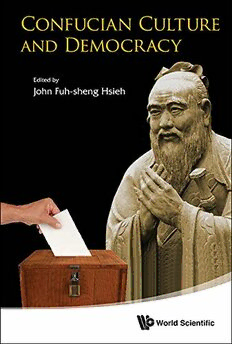
Confucian Culture and Democracy PDF
Preview Confucian Culture and Democracy
9125_9789814596381_TP.indd 1 27/8/14 11:06 am May2,2013 14:6 BC:8831-ProbabilityandStatisticalTheory PST˙ws TThhiiss ppaaggee iinntteennttiioonnaallllyy lleefftt bbllaannkk World Scientific 9125_9789814596381_TP.indd 2 27/8/14 11:06 am Published by World Scientific Publishing Co. Pte. Ltd. 5 Toh Tuck Link, Singapore 596224 USA office: 27 Warren Street, Suite 401-402, Hackensack, NJ 07601 UK office: 57 Shelton Street, Covent Garden, London WC2H 9HE Library of Congress Cataloging-in-Publication Data Confucian culture and democracy / edited by John Fuh-sheng Hsieh. pages cm Includes bibliographical references and index. ISBN 978-9814596381 1. Democracy--East Asia. 2. Democracy--Religious aspects--Confucianism. 3. Confucianism-- Political aspects--East Asia. 4. Confucianism and state--East Asia. 5. Political culture--East Asia. 6. East Asia--Politics and government--1945– I. Hsieh, John Fuh-sheng, 1951– editor of compilation. JQ1499.A91C66 2014 306.2095--dc23 2014017659 British Library Cataloguing-in-Publication Data A catalogue record for this book is available from the British Library. Copyright © 2015 by World Scientific Publishing Co. Pte. Ltd. All rights reserved. This book, or parts thereof, may not be reproduced in any form or by any means, electronic or mechanical, including photocopying, recording or any information storage and retrieval system now known or to be invented, without written permission from the publisher. For photocopying of material in this volume, please pay a copying fee through the Copyright Clearance Center, Inc., 222 Rosewood Drive, Danvers, MA 01923, USA. In this case permission to photocopy is not required from the publisher. In-House Editors: Li Hongyan/Chitralekha Elumalai Typeset by Stallion Press Email: [email protected] Printed in Singapore Chitralekha - Confucian Culture and Democracy.indd 1 19/6/2014 9:51:13 AM b1789 Confucian Culture and Democracy 2 September 2014 9:01 AM Contents Preface vii About the Editor ix About the Contributors xi Chapter 1 Introduction: Democracy, Confucian Style? 1 John Fuh-sheng Hsieh Chapter 2 Protest Confucianism and Postwar Japanese Democratic Practice 21 John A. Tucker Chapter 3 Identity and Democratic Values in Divided Taiwan 33 I-chou Liu and Kuang-hui Chen Chapter 4 The Political Logic of Public Policymaking in Democratizing Taiwan 57 Joseph Wong Chapter 5 Adaptations in Korea: Confucianism, Democracy, and Economic Development 85 John Kie-Chiang Oh Chapter 6 The Politics of Confucianism and Asian Values in Singapore 111 Lam Peng Er v bb11778899__FFMM..iinndddd vv 0044--0099--22001144 0066::3344::5522 b1789 Confucian Culture and Democracy 2 September 2014 9:01 AM vi Contents Chapter 7 Confucianism and Pluralism in a Meritocratic Society: The Singapore Case 131 Thomas J. Bellows Chapter 8 Confucian Values and Democratic Governance in Hong Kong 161 Joseph Y. S. Cheng Chapter 9 Changes in Political Values in Mainland China Since the 1990s: Evidence from Surveys 197 Gang Guo Chapter 10 O n Local Governance in China: From Feudalism, Centralized Bureaucracy, to Self-Governance 225 Emerson M. S. Niou Index 247 bb11778899__FFMM..iinndddd vvii 0044--0099--22001144 0066::3344::5522 b1789 Confucian Culture and Democracy 2 September 2014 9:01 AM Preface Whether Confucian culture — or more specifically, Confucianism — is compatible with democracy has been a controversial issue since time immemorial. Just a couple of decades ago, the conventional wisdom seemed to hold that the two were antithetical to each other even though Japan, a country with somewhat dubious Confucian legacy, was able to maintain democratic rule for quite some time. Yet, as Taiwan and South Korea, two unequivocally Confucian societies, transited to democracy, the mood shifted. Now, more sanguine assess- ment of Confucian legacy is common. This edited volume represents an effort to assess the complicated links between Confucianism or Confucian culture on the one hand and democratization or democratic governance on the other. It origi- nated from a conference on democracy in Confucian societies held at the University of South Carolina (USC) in April 2004. The confer- ence was sponsored by the Taiwan Foundation for Democracy (TFD). I would like to express my sincere gratitude to the TFD, especially Dr. Michael Kau, for providing this opportunity for scholars with dif- ferent backgrounds to get together to discuss this important topic. I would also like to thank the USC Center for Asian Studies for assist- ing in organizing the conference. Ms. Polly Brown of the Center, along with several graduate assistants, Sam-san Jo, Shih-hung Peng, and Che-chuan Lee, managed the event smoothly and efficiently. I greatly appreciate the contributions of all the participants of the conference for their insightful comments and suggestions. In vii bb11778899__FFMM..iinndddd vviiii 0044--0099--22001144 0066::3344::5533 b1789 Confucian Culture and Democracy 2 September 2014 9:01 AM viii Preface particular, I would like to thank Professor William Theodore de Bary for giving a keynote speech at the conference. Regrettably, two of the participants, Professors Lucian W. Pye and John Kie-Chiang Oh, passed away later. They will be remembered. Special thanks go to Professor Bonnie Oh, Professor John Oh’s wife. With her permission, we include Professor John Oh’s article in this volume. bb11778899__FFMM..iinndddd vviiiiii 0044--0099--22001144 0066::3344::5533 b1789 Confucian Culture and Democracy 2 September 2014 9:01 AM About the Editor John Fuh-sheng Hsieh is a Professor of Political Science at the University of South Carolina. His teaching and research interests include rational choice theory, constitutional choice, electoral systems, electoral behavior, political parties, democratization, and foreign policy. He is the author or co-author of Positive Political Theory [in Chinese], A Comparative Study of Referendums [in Chinese], Party-List Proportional Representation [in Chinese], and On the Participation of Interest Groups in the Political Process [in Chinese]. He is also the co- editor of The Scope and Methods of Political Science [in Chinese] and How Asia Votes. His works appeared in many books and journals. ix bb11778899__FFMM..iinndddd iixx 0044--0099--22001144 0066::3344::5533
